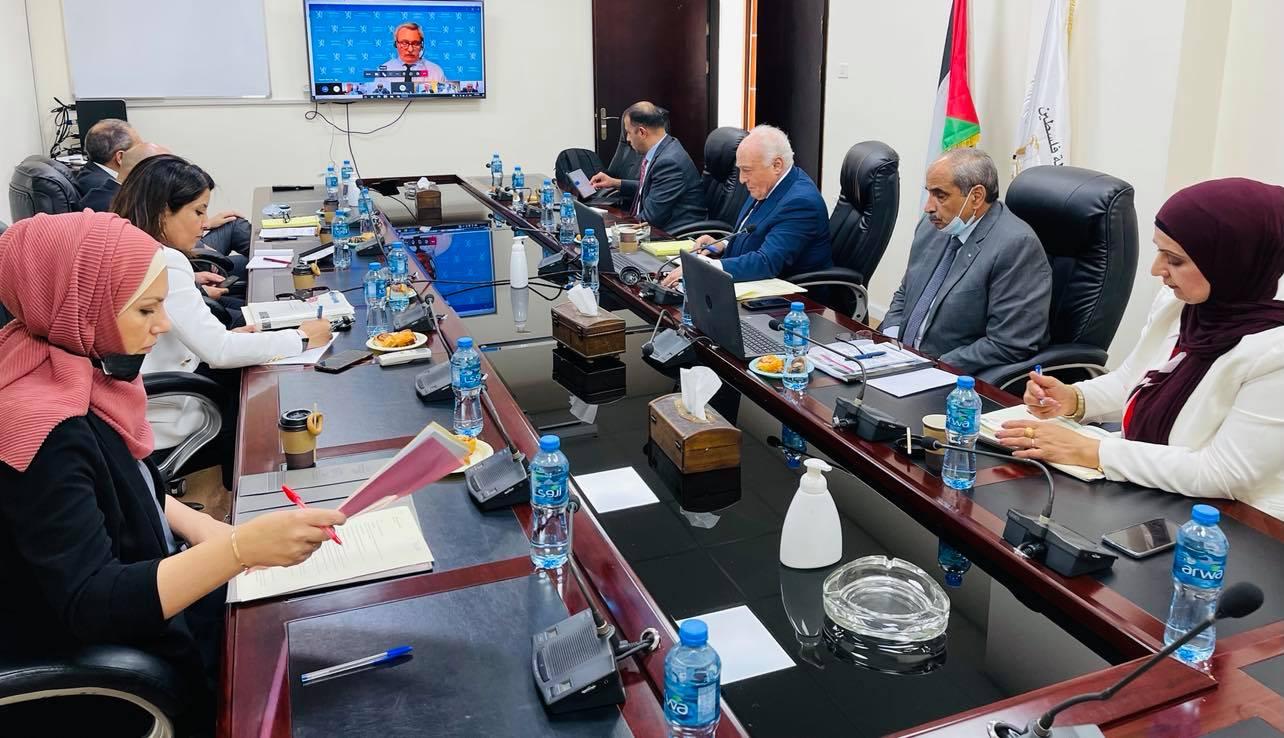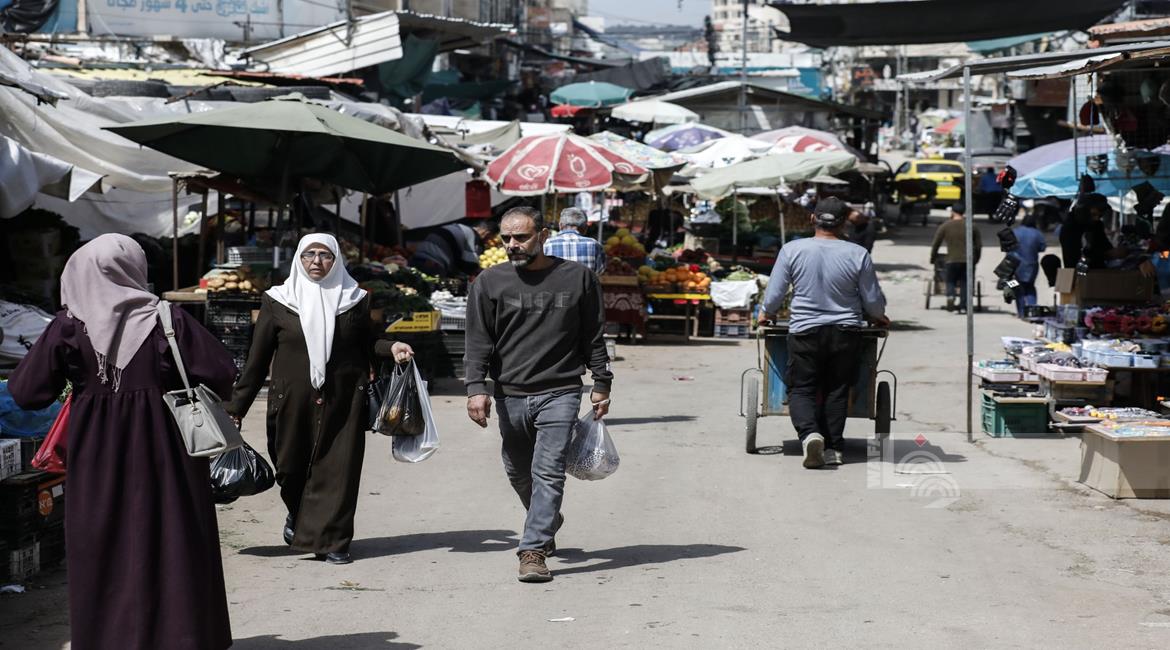RAMALLAH, Thursday, 08 July 2021 (WAFA) - Finance Minister Shukri Bishara warned of a bleak future if finances with Israel are not set straight and called on the international community to assist the Palestinian Authority (PA) in settling the outstanding financial files with Israel, which would save the PA over $500 million annually, in order to avoid a financial collapse in light of the decline in international grants and the Palestinian economy reaching the limit in generating domestic revenues.
Bishara said, in a meeting with representatives of donor countries, that the settlement of these files provides additional revenues to the Palestinian treasury by about $500 million annually, sufficient to reduce the deficit, thus obviating the need for international aid to finance current expenditures.
Among these files is the exemption from the accumulated fees for departing travellers that have accumulated since 2008, as Israel is currently withholding about 740 million shekels ($225 million).
Also, reducing the commission that Israel collects in return for collecting the Palestinian clearance funds from 3% to 1%, and more transparency in Israeli deductions for services (water, electricity, sanitation, and health).
Bishara said that the total amount of these deductions in 14 years amounted to $10 billion.
The Palestinians also called on Israel to release the deductions that have been withheld unilaterally from the clearing proceeds since 2019, an accumulated amount of 810 million shekels ($247 million) of money the PA had allocated to the families of the martyrs, prisoners and the wounded, and the immediate demand to stop those deductions.
Among the pending files are also taxes and fees on fuel purchases from Israel, as the PA demands tax exemption from the Israeli fuel providing company that amounts to about 40 percent of the monthly clearance revenues of the PA.
Bishara said that by not paying this percentage, it would allow the PA to save up to $82 million per month in cash flow.
In the short term, the Finance Minister called for changing the paper-based clearing mechanism for the value-added tax with Israel, which he considered "ineffective and entails a high risk of fraud” that leads to significant losses for the PA estimated at $120 million annually.
He called for pressuring Israel to move to a computerized system connected to the point of sale to obtain tax deductions.
Bishara also called on donors to pressure the Israeli government to allow the return of Palestinian customs officials to exercise their duties and responsibilities at al-Karama (Allenby/King Hussein) bridge crossing with Jordan, and to transfer tasks and the customs authority in customs clearance from Israel to Palestine, including the establishment of customs clearance facilities and warehouses in various locations in the West Bank, provided that Palestine assumes full responsibility for customs clearance of goods destined for its markets.
The Minister of Finance warned of a rise in the financial difficulties of the government after a series of crises over the past three years at a time donor aid is close to zero.
He revealed that the total aid received by the treasury, from the beginning of this year until the end of June, amounted to only $30 million, out of the $210 million projected in the budget for the first half of this year.
According to Bishara, the total revenues in the first half of this year amounted to $1.93 billion, which is almost identical to the value estimated in the budget of $1.94 billion.
“These values reflect an 18% increase in revenues compared to the same period last year, which amounted to $1.6 billion,” Bishara said.
In contrast, total expenditures during the first six months of this year amounted to $2.5 billion, 12 percent lower than the proposed budget ($2.8 billion), but 23 percent higher compared to the same period last year.
Bishara said: “Given the exceptional efforts to increase revenues and strict restrictions on expenditures, the semi-annual deficit on cash basis amounted to about $470 million, and we expect it to reach $900 million by the end of the year, which means 20% lower for the full-year deficit of $1.1 billion.”
He added, "We must not allow ourselves to be complacent with this reality, nor with the false sense of normalcy, and we must not overlook the threats to the financial stability of the Palestinian National Authority, which is getting more and more severe every day."
He continued: "With regard to revenues, we are rapidly approaching the maximum amount that we can generate from the prevailing economic conditions, and from what we have a degree of control over."
The Finance Minister considered that all the government's financial reform initiatives, despite their importance, "will not help in addressing or reversing the structural obstacles that are a direct and absolute result of 55 years of continuous military occupation."
He added, "There is a limit to what we can do in terms of rationalizing spending, and this is given the fact that we only have pro forma operational control over 20% of the occupied Palestinian territory, while bearing the associated expenditures for 80% of what is left of it."
In this context, Bishara said that the government's spending on the Gaza Strip is 35% of the total general spending, without getting any revenues from there.
Also, the government bears significant costs incurred in East Jerusalem, especially with regard to the Arab medical facilities as most of them deal with referrals of Gaza patients, in addition to the support for the Jerusalem Electricity Company, which constitutes about 4% of the operating budget, without recovering the costs.
He said the same applies to the costs of Area C of the occupied West Bank which is under full Israeli military rule. “Not only that we are unable to generate financial revenues in that area, but our lack of an operational presence in the area, which has greatly contributed to the phenomenon of net lending (amounts deducted by Israel from the clearance for electricity), which costs the treasury about $300 million, a third of which is from Area C.
The Minister of Finance stressed that government borrowing from banks "is no longer an option due to the limited liquidity conditions of the Palestinian banking sector."
He explained: "It is true that our domestic commercial debt is still at a modest level at 15 percent of GDP, and less than 25 percent of the total balance of outstanding loans in Palestine."
The government's debt to banks currently stands at about $2.3 billion, up from $1.4 billion in 2019, according to the Minister of Finance.
Bishara said that in light of the existing financial conditions, "we are left with nothing but the path that we literally set in all previous Special Coordination Committee meetings, which is to focus our collective efforts on resolving long-standing issues (with Israel) under the Paris Economic Protocol,” adding, “This would significantly reduce our operating deficit and, in the short term, help us avoid an imminent financial collapse."
M.K.












